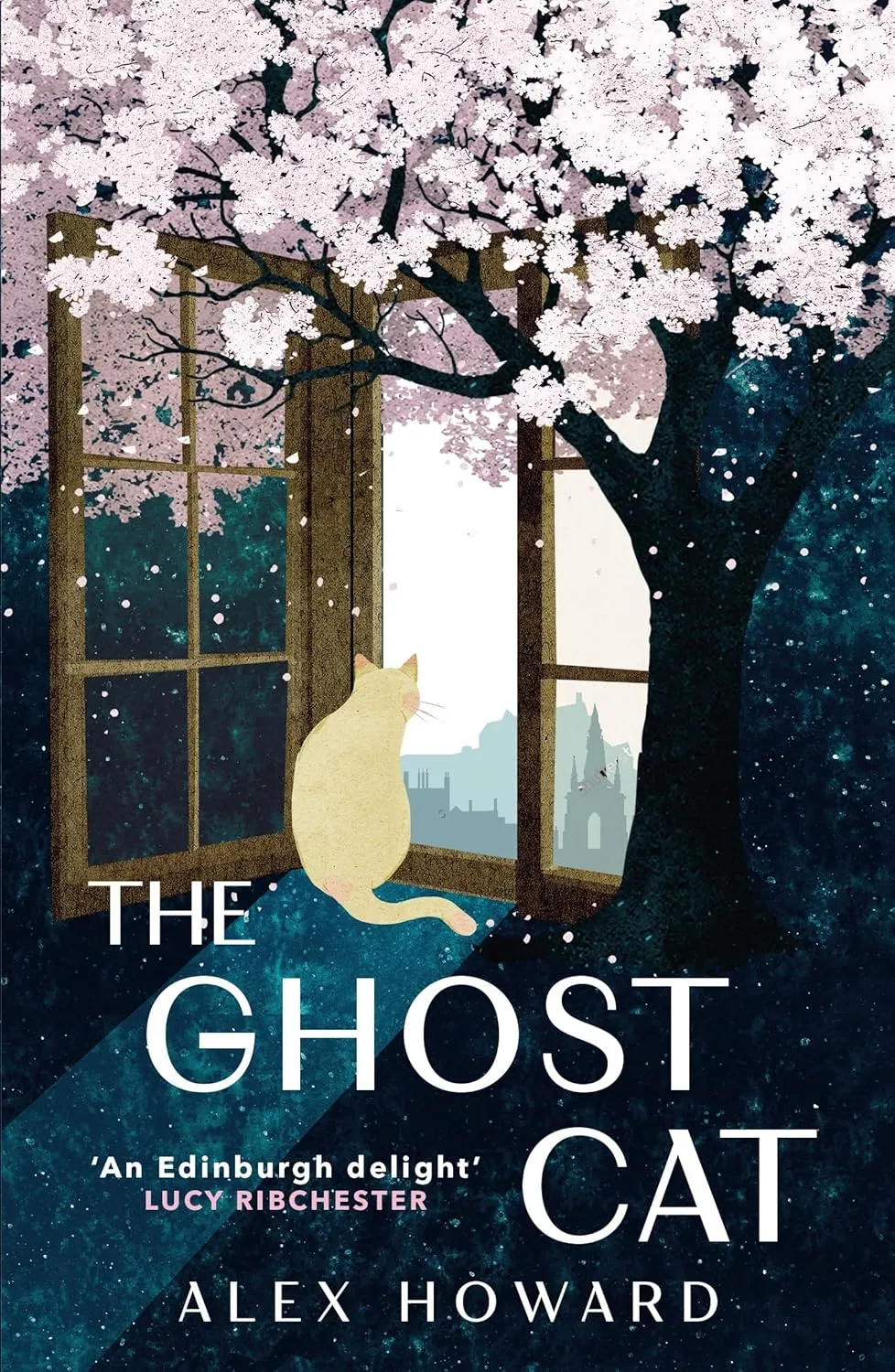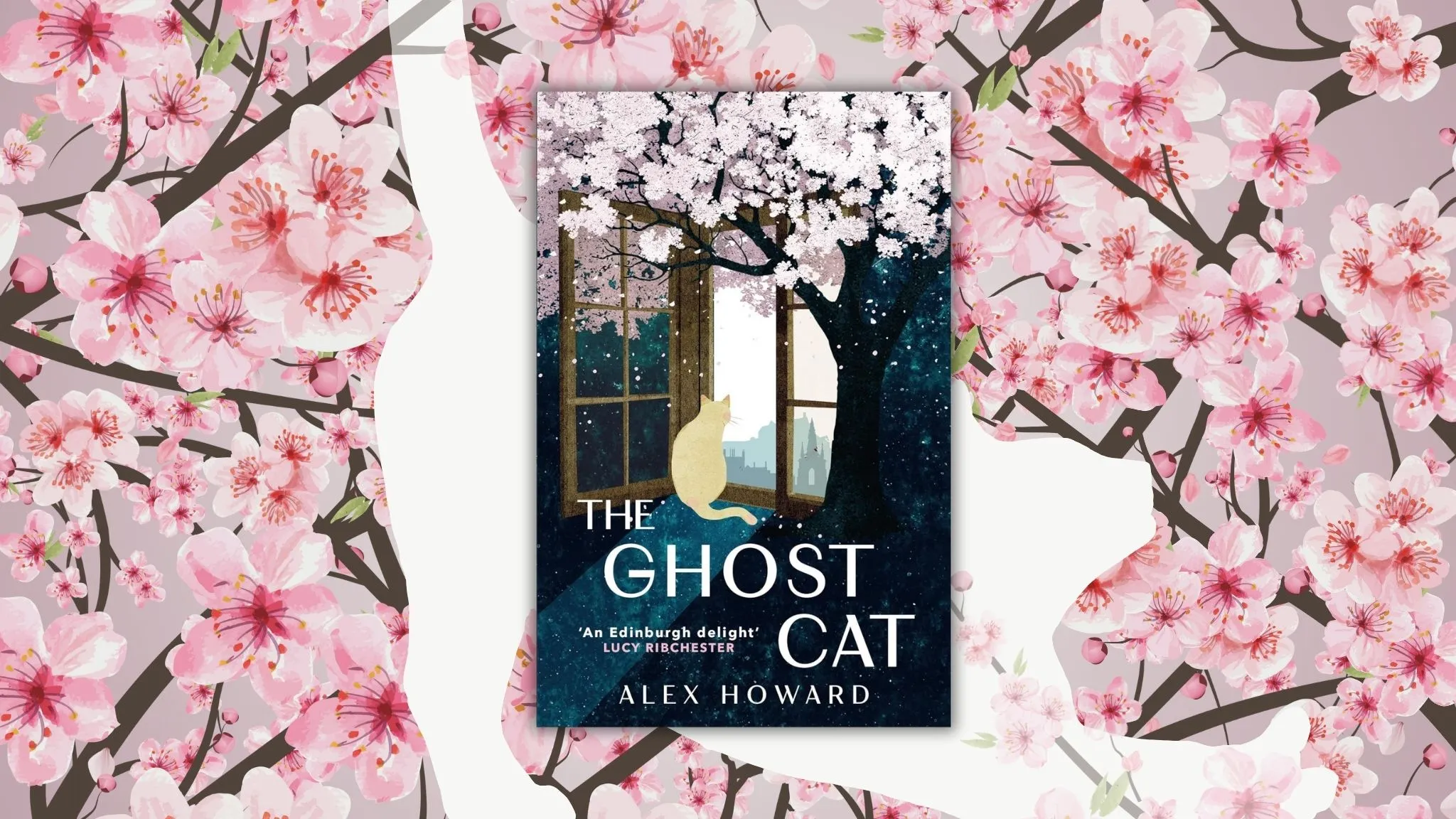The Ghost Cat by Alex Howard
Alex Howard ensnares hearts with his engaging, upbeat writing and one can only hope for more.
Author Alex Howard completed his doctorate in English Literature while writing his first published book The Library Cat: The Observations of a Thinking Cat, winner of the People’s Book Prize and translated into several languages. This Edinburgh native wears many hats as a theater professional as well as being an editor and author of prose and poetry. He is also a hugely popular TikTok contributor with the handle @housedoctoralex where he chronicles his experiences of DIY renovations of the historic tenement flat he shares with his wife, son and cat Tabitha.
Some may suspect Tabitha is channeling her inner thoughts through his keyboard as his present book, The Ghost Cat, follows a cat named Grimalkin through nine lives occurring during an eventful span of 120 years. It’s a delightful little book, highly recommended as being a suitable soothing bedtime story for cat lovers and people of all ages.
According to an old English proverb referenced in the preface: A cat has nine lives. For three he plays, for three he strays, and for the last three he stays.
Historic Romp Through Edinburgh
The story takes place in Edinburgh, beginning on an early morning in 1902 during the reign of King Edward VII and on the final day of Grimalkin’s life.
Fifteen years earlier, in 1887, this beloved cat was rescued from almost certain death when 7-year-old Eilidh found the cold and starving little mite, accidentally deserted by his mama kitty and litter mates in the corner of a smelly stable. It was near her mother’s workplace, 7/7 Marchmont Crescent, an attractive tenement owned by Mr. Calvert, a cartographer. The child was an apprentice chargirl in this well-appointed flat, grateful to be allowed to keep the fortunate ginger moggy (UK term for mixed breed cat), and devotedly cared for him all the days of his first life.
American readers, in particular, should note that in Scotland a tenement is essentially a 19th or early 20th century condominium and not an ill-maintained cramped slum. They are buildings with several individually owned flats typically with one residence per floor with a shared main entrance and common garden as well as apportioned maintenance expenses. In the medieval Old Town, they are desirable upscale housing with their fine architectural detailing, enclosed gardens, historical significance and high property values given the close proximity to the University and city center.
While the address “7/7” is fictional, the real Marchmont Crescent neighborhood remains prime real estate. It was a planned middle class suburb of 4-5 story tenements primarily built in what is described as the Scottish Baronial style with most completed in the 1870’s through the 1880’s. The Ghost Cat starts with an advertisement describing the features and amenities of this particular flat ready for occupancy in 1880.
Second Chance at Nine Lives
Grimalkin had grown to be a handsome cat exuding an air of quiet wisdom and dignity though in his prime he’d fought a few battles in the garden and sired an untold number of kittens. With the concomitant aches and pains of a senior cat, he was now content to snooze on a padded chair in the library or doze by the fireside.
On his final day, a chilly September morning, he rejected his breakfast but snuggled with his favorite human Eilidh, breathing in her familiar scent of beeswax polish while gazing into her sparkling eyes. This contemplative cat curled into a ball before the fire and breathed his last.
He awoke pain free, in a dreamlike state in a dark forest with a floor of soft green moss. It was rather alarming to be in such a large open area when his outings had ostensibly been limited to an urban walled garden. More frightening was the sight of a gigantic black cat with a bright white spot on its chest and glowing eyes that clambered up a golden throne and began questioning Grimalkin.
This was Cat-Sith, the King of Cats of Scottish and Irish mythology associated with magic and superstitions about cats including the legendary nine lives and perhaps the most unusual fairy in Celtic folklore. However, this humungous cat was no myth and now revealed Grimalkin had been accidentally robbed of eight of the nine lives to which he was entitled.
He could not restore him to life but gave Grimalkin the choice of immediately passing into eternal peace or returning to earth to observe the future in brief interludes with a cautionary warning: While this option allows immunity from corporeal suffering of the body, it by no means guards you against the emotional sufferings of the soul.
A Series of “Hauntings”
The choice was obvious and when Grimalkin next awoke he was seated in the bay window of 7/7 Marchmont Crescent in the year 1909. The flat had been redecorated and had a new master but the older, plumper, beloved Eilidh stayed as a combination housekeeper/cook to a Mr. Cavendish, publisher. His dinner guest would be the esteemed author James M. Barrie whom he hoped to persuade to sell him the rights to Peter Pan.
Each chapter or “haunting” concludes with Grimalkin’s observations of decorations, humans, technology and reigning monarch. They all take place in or near 7/7 Marchmont Crescent. Our protagonist cat has firm opinions and fully yet succinctly expressed likes and dislikes of certain humans in each of his appearances.
Fellow booklovers will take note, as he does, of changes in ownership or tenancy of the flat along with the fashions in interior design and decorations. There is a gradual state of decline to the home reaching its nadir in the third quarter of the 20th century before the pendulum swings with extensive restorations having taken place before the final chapter.
Heartfelt Tribute to Cats
The Ghost Cat ends in 2022 after the death of Queen Elizabeth II and the coronation of King Charles III. The subsequent hauntings occur in the years 1935, 1942, 1953, 1969, 1997, 2008 and 2022. There will be reappearances of a few of the humans including touching tributes to Eilidh.
As time passes, Grimalkin is sensed, intuited or seen by certain individuals and animals and his powers increase. He becomes able through sheer determination to move small objects and manipulate keys on a laptop thereby effecting impactful changes.
Each chapter opens a small window in Edinburgh’s rich history and provides a glimmer into the mind of a thinking cat.
The Ghost Cat is a satisfying tribute to cats known and loved and to the power they hold over their humans. Cat minders (one should never presume to say “owner”) will undoubtedly recognize their own felines in Grimalkin’s actions. There will be a mixture of love, laughter and possibly a few tears shed when perusing this enchanting book that would be the perfect gift for many recipients.
Alex Howard ensnares hearts with his engaging, upbeat writing and one can only hope for more. He is in excellent company with Edinburgh’s own Sir Alexander McCall Smith, Jenny Colgan, Muriel Spark and a host of others.
 Alex Howard is an author, editor and theatre professional from Edinburgh. His TikTok page, Housedoctoralex, has nearly 300,000 followers and has been featured on television and in the national press.
Alex Howard is an author, editor and theatre professional from Edinburgh. His TikTok page, Housedoctoralex, has nearly 300,000 followers and has been featured on television and in the national press.
A doctoral graduate of English literature, Alex wrote his first book Library Cat while completing his PhD. It won the People’s Book Prize in 2017 and has been translated into French, Korean and Italian. He also writes poetry, which has been published in New Writing Scotland, Gutter and The London Magazine, among others, and his academic book, Larkin’s Travelling Spirit, was published in 2021 by Palgrave McMillan.
Alex works at Capital Theatres as a creative engagement coordinator and editor while renovating his Edinburgh tenement flat on weekends, with his cat Tabitha, son Sasha and wife Ellie.

Publish Date: 8/27/2024
Genre: Fantasy, Fiction, Historical Fiction
Author: Alex Howard
Page Count: 272 pages
Publisher: Hanover Square Press
ISBN: 9781335012333
Read the original article here



